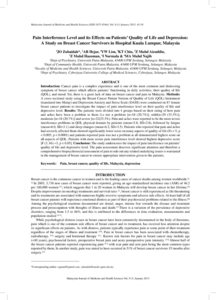Citation
Jamil @ Osman, Zubaidah and Abdul Rahman, Hejar and Lim, Y. W. and Chin, K. T. and Z., Muhd Aizuddin and Zakaria, Mohd Hazeman and Ibrahim, Normala and Mohamad Alwi, Muhammad Najib
(2013)
Pain interference level and its effects on patients' quality of life and depression: a study on breast cancer survivors in Hospital Kuala Lumpur, Malaysia.
Malaysian Journal of Medicine and Health Sciences, 9 (1).
pp. 45-54.
ISSN 1675-8544
Abstract
Introduction: Cancer pain is a complex experience and is one of the most common and distressing symptom of breast cancer which affects patients’ functioning in daily activities, their quality of life (QOL), and mood. Yet, there is a great lack of data on breast cancer and pain in Malaysia. Methods: A cross-sectional study using the Breast Cancer Patient Version of Quality of Life (QOL) Instrument (translated into Malay) and Depression Anxiety and Stress Scale (DASS) were conducted on 87 female breast cancer patients to investigate the impact of pain interference level on their quality of life and depressive level. Results: The patients were divided into 4 groups based on their rating of how pain and aches have been a problem to them (i.e not a problem [n=18 (20.7%)], mild[n=29 (33.3%)], moderate [n=18 (20.7%)] and severe [n=22(25.3%). Pain and aches ware reported to be the most severe interference problems in QOL physical domain by patients (mean=5.8, SD=2.8), followed by fatigue (mean=6.0, SD=3.1) and sleep changes (mean=6.2, SD=3.5). Patients who reported that pain and aches had severely affected them showed significantly lower score on many aspects of quality of life (Fs > 5, p < 0.005; p < 0.0001) and patients reported pain was not a problem at all demonstrated highest score on all aspects of QOL. Patients with most severe pain interference level showed highest depressive score [F (3, 84) =3, p < 0.05]. Conclusion: The study underscores the impact of pain interference on patients’ quality of life and depressive level. The pain assessment deserves significant attention and therefore a comprehensive biopsychosocial assessment of pain to rule out any related underlying issues is warranted in the management of breast cancer to ensure appropriate intervention given to the patients.
Download File
![[img]](http://psasir.upm.edu.my/41353/1.hassmallThumbnailVersion/Pain%20interference%20level%20and%20its%20effects%20on%20patients%E2%80%99%20quality%20of%20life%20and%20depression.pdf)  Preview |
|
PDF (Article)
Pain interference level and its effects on patients’ quality of life and depression.pdf
Download (167kB)
| Preview
|
|
Additional Metadata
Actions (login required)
 |
View Item |

